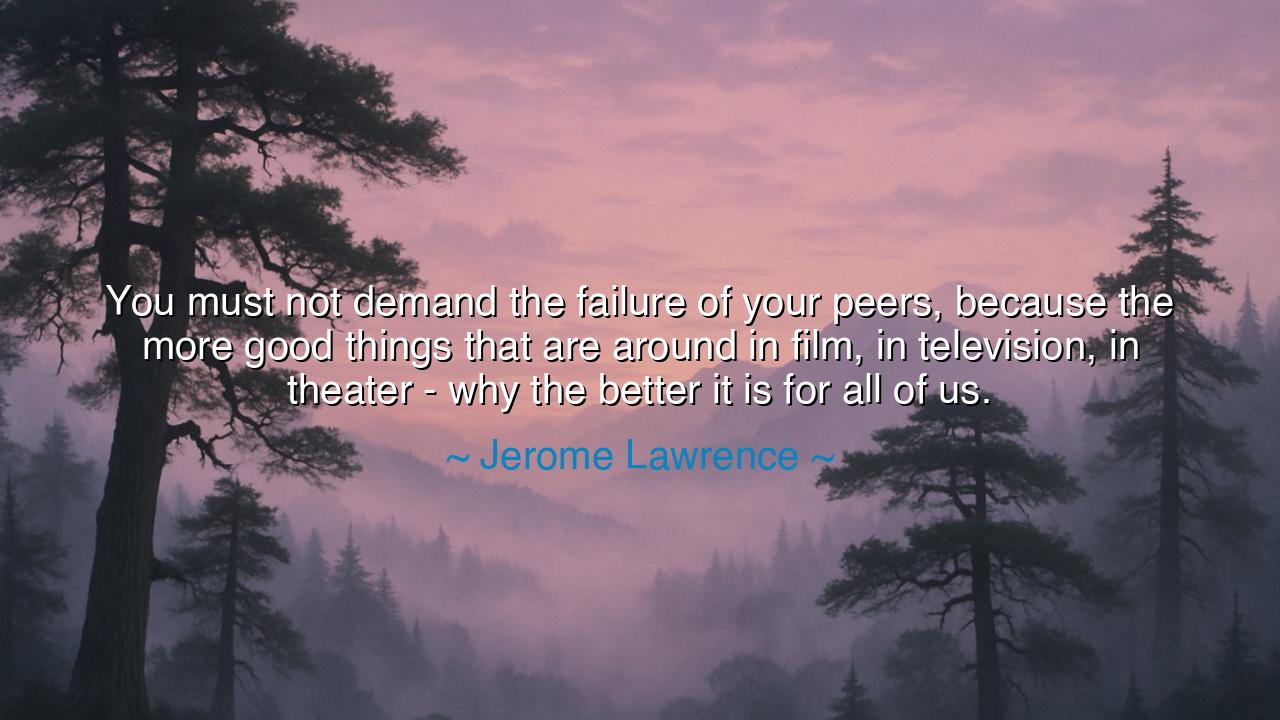
You must not demand the failure of your peers, because the more
You must not demand the failure of your peers, because the more good things that are around in film, in television, in theater - why the better it is for all of us.






Opening Scene
The room is softly illuminated by the warm glow of a table lamp, casting shadows as the evening begins to settle in. Outside, the city is quieter now, the usual hum of activity fading into stillness. Jack sits at the table, a pen in hand, lost in thought. Jeeny stands near the window, looking out at the view below. The mood is calm, but there’s a sense of reflection in the air, as though a conversation about competition, collaboration, and the value of shared success is about to unfold.
Host: After a few moments of silence, Jeeny turns from the window, her voice steady but filled with thought, breaking the quiet.
Jeeny: “I came across a quote by Jerome Lawrence that really struck me. He said, ‘You must not demand the failure of your peers, because the more good things that are around in film, in television, in theater - why the better it is for all of us.’ It made me think about how we often see success as a zero-sum game, where one person’s victory means someone else’s loss. But Lawrence seems to suggest that success in the creative world can be a shared benefit. What do you think? Is there space for all of us to succeed together?”
Jack: “I love that quote because it speaks to the idea of abundance rather than scarcity. In the world of entertainment, whether it's film, television, or theater, there’s often this competitive pressure to outshine others, to claim a bigger piece of the pie. But Lawrence is pointing out that the success of others only enriches the environment for everyone. The more high-quality work that’s out there, the better it is for the entire industry. It creates a culture of collaboration rather than competition.”
Jeeny: “Exactly. I think we tend to forget that success doesn’t always have to be at the expense of someone else. When someone else succeeds, especially in the creative world, it doesn’t diminish your own success — it makes the whole industry stronger. More diversity, more variety, more creativity — it raises the bar for everyone. We don’t need to tear down our peers to build ourselves up. In fact, it’s the opposite: when one person does well, it opens doors for others and fosters a spirit of growth and shared success.”
Jack: “Right. It’s like the idea of rising tides lifting all boats. In an environment where good work is happening everywhere, it encourages everyone to keep pushing forward and to keep getting better. Whether it’s through creative breakthroughs, new stories, or fresh perspectives, more good work means more opportunities for all of us. And it’s a reminder that we’re all part of something bigger — a larger community of creators that should be lifting each other up, not tearing each other down.”
Host: The conversation deepens, and Jeeny moves closer to the table, sitting across from Jack. Her voice steady as she continues.
Jeeny: “And I think that’s the true power of collaboration. We don’t live in isolated worlds; we exist in a shared creative space. The success of one person can have a ripple effect on the entire industry, whether it’s through inspiring others, setting new trends, or just creating more opportunities for everyone. The more people succeed, the more chances there are for innovation and growth across the board.”
Jack: “Exactly. And there’s something about celebrating other people’s successes that allows you to grow too. If you’re constantly thinking that someone else’s success means your failure, you’re limiting your own potential. But if you embrace the idea that we’re all part of this collective journey, and that one person’s win is a win for all of us, it opens up a whole new world of possibility. It’s not just about individual achievement — it’s about building an industry that thrives as a whole.”
Jeeny: “And that mindset creates a healthier and more supportive environment for everyone involved. When we root for our peers rather than hope for their downfall, we create a culture of respect and collaboration. Everyone benefits when we embrace the idea that the success of others doesn’t diminish our own potential. It just makes the whole space more exciting and full of possibility.”
Jack: “Exactly. It’s about creating a community where success is something that everyone can share in. When we stop seeing other people’s achievements as threats, and start seeing them as opportunities to grow and learn, we create a stronger and more vibrant industry.”
Host: The room quiets for a moment as Jack and Jeeny reflect on the deeper meaning behind Jerome Lawrence’s words. Outside, the world continues, but inside, there’s a quiet understanding about the power of collaboration and the importance of a shared vision for success.
Jeeny: “So, maybe the lesson here is that we don’t have to view success as a competition. By supporting each other and recognizing that the success of our peers benefits us all, we can create a healthier, more inclusive environment that encourages creativity and growth.”
Jack: “Exactly. The more good things we have in the world — in any industry — the better it is for everyone. We should be cheering each other on, because when one of us succeeds, it opens the door for more opportunities and better work all around.”
Host: As the evening continues, the conversation wraps up with a quiet understanding. In the creative world, and beyond, success doesn’t have to be a zero-sum game. By supporting our peers, celebrating their victories, and focusing on shared growth, we all contribute to a richer, more vibrant environment where everyone can thrive.






AAdministratorAdministrator
Welcome, honored guests. Please leave a comment, we will respond soon